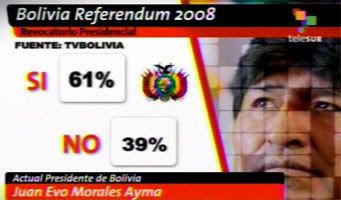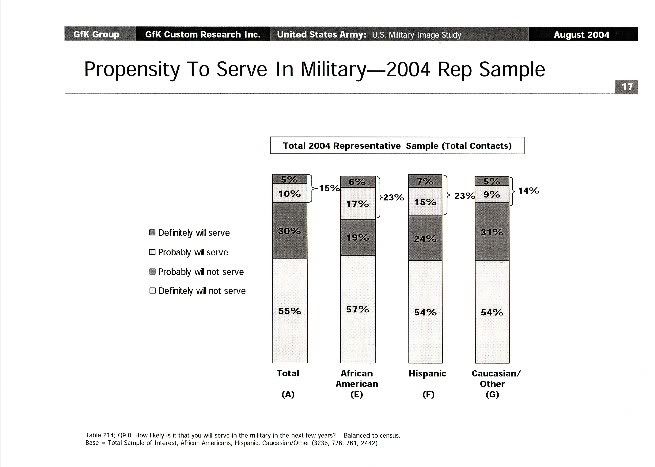Bolivia: Morales Wins amidst Opposition Pressureby Franz Chávez
LA PAZ, 11 August (IPS) -- A storm of opposition broke out in Bolivia against President Evo Morales, whose mandate was resoundingly ratified by more than 63 percent of the votes in the referendum according to the consensus of exit polls broadcast by the major television networks in the country.
Bolivia has been shaken by the fiery speech of the leftist leader, who after confirming his new triumph offered to reconcile his proposed new constitution with the autonomy statutes approved in the departments of Santa Cruz, Beni, Pando, and Tarija, and the fervent rejection of his proposal by the opposition leader, Santa Cruz Governor Rubén Costas, whose mandate was also ratified.
While Morales called for unity between the departments in the west of the country, where he received the highest level of support, and the so-called "Media Luna" in the east, Costas said that the majority vote for non-ratification of the presidential mandate in this area and Chuquisaca in the south means a rejection of "dictatorship and the draft constitution that leads to confrontation among brothers."
The main square of La Paz, awash with supporters of the ruling Movement toward Socialism (MAS), roared when Morales ended his speech with the phrase coined by the Cuban Revolution "Patria o Muerte (Fatherland or Death)," the crowd shouting in response: "We will win!"
1,000 kilometers east of the seat of government, in the 24th of September Square in Santa Cruz de la Sierra, a chorus of supporters of rightist Costas repeated the word "independence" while he proclaimed the local victory against "Chavista Evoism."
With this particular expression, the followers of the leader of the Cruceño conglomerate of employers, landlords, and rightist groups, united in a conservative civic movement, are trying to tie the internal politics of Morales with his main external political ally, Venezuelan President Hugo Chávez.
The ATB television network reported that, according to the exit polls, the yes vote for ratification of the mandate of the first indigenous president of Bolivia and Vice President Álvaro García Linera added up to 63.1 percent of the total votes at all the polling stations installed on Sunday.
For its part, the Unitel television network announced a 63.52 yes vote, based on the count of the surveys from 93 percent of the polling stations.
To remove Morales and García Linera from their office, the no votes had to exceed 53.740 percent of the valid votes, which was the percentage that this slate won in the December 2005 elections. In the case of the eight governors who also put their mandates at stake on Sunday, the rejection had to be more than 50 percent to remove them.
Morales's victory is a bittersweet one, political analysts hastened to say, seeing the president with strong support in only the departments of La Paz, where his support reached 81 percent of the votes; Oruro, 81 percent; Potosí, 79 percent; and Cochabamba, 71 percent.
Instead, the voices in favor of revocation of the mandate of the leftist leaders at the helm of the government dominated in Santa Cruz, where the yes votes were only 39 percent, while they reached 43 percent in Beni, 49 percent in Pando, 47 percent in Tarija, and 46 percent in Chuquisaca, according to data from Unitel.
The preliminary count of the referendum votes on television channels, in the case of the governors, indicates that the governor of the department of La Paz, José Luis Paredes, must leave his office as 57 percent of the voters said no.
Thus the Paceños condemend the unstable behavior of this political veteran, which oscillated between independence and clear pronouncements in favor of autonomy and influential groups of the autonomist departments, on top of his style of administration characterized as corrupt by the national government.
In Cochabamba, Governor Manfred Reyes Villa also lost with disapproval of 60 percent of the electorate, among whom are coca growers who support Morales, their former trade union leader, and opponents of the administration of the rightist regional leader and former ally of President Gonzalo Sánchez de Lozada (1993-1997 and 2002-2003).
The ranks of government supporters, meanwhile, lost the governorship of the Oruno department, held by Alberto Aguilar, who was rejected by 54 percent of the voters, according to preliminary data from the exit polls.
At the forefront of the victors is the rightist Costas, who obtained a 66 percent support, the result that he interpreted as support for the process of autonomy, which he heads along with the local governments of Beni, Pando, and Tarija.
With the strength of support for his mandate, Costas proclaimed the creation of an "organ of security" parallel to the police, a tax collection agency, and an office of coordination to transfer resources generated from oil to other departments, replacing the Ministry of Finance that currently fulfils this role.
Among the opposition leaders who received the most votes is Tarija Governor Mario Cossío, who ran against the forecasts portending his defeat and won a 64 percent approval.
Beni Govenor Ernesto Suárez received a 61 percent support, while his Pando counterpart Leopoldo Fernández got a 56 percent support, according to the same initial unofficial calculations.
Mario Virreina from the governing party, who runs the department of Potosí, surprised by the wide support of 75 percent he won. He is the only card that the Movement toward Socialism has at the level of local governments.
The original article in Spanish appeared on the Web site of IPS on 11 August 2008. Translation by Yoshie Furuhashi.


 Having dumped Black brokers who emerged from movement politics, the Democratic Party cultivated the great white hope of a Black politician, Barack Obama, whose message on race and class would never alarm even the most anxious white mind: "There's not a black America and white America and Latino America and Asian America; there's the United States of America" (Barack Obama, Keynote Speech at the Democratic National Convention, Boston,
Having dumped Black brokers who emerged from movement politics, the Democratic Party cultivated the great white hope of a Black politician, Barack Obama, whose message on race and class would never alarm even the most anxious white mind: "There's not a black America and white America and Latino America and Asian America; there's the United States of America" (Barack Obama, Keynote Speech at the Democratic National Convention, Boston, 





